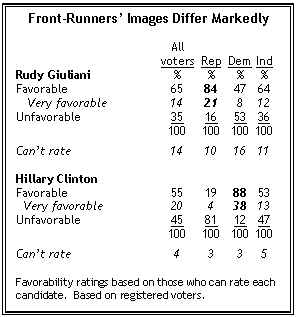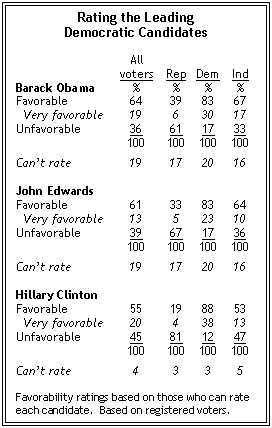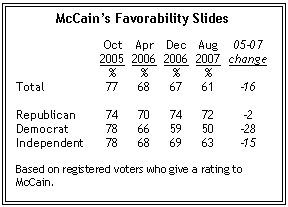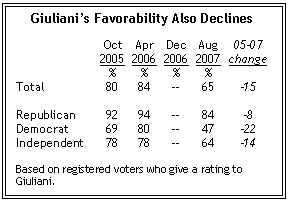Summary of Findings

Sen. Hillary Clinton is by far the most popular presidential candidate among her own party’s voters, but has among the lowest overall favorable ratings of the leading candidates. In sharp contrast, the front-running Republican candidate, Rudy Giuliani, evokes relatively modest enthusiasm from the GOP base, but is as broadly popular with all voters as any candidate in either party.
Overall, 55% of voters who offer an opinion of Clinton express a favorable view of her, while 45% have unfavorable opinion. By comparison, roughly two-thirds of voters able to rate Giuliani (65%) and fellow Republican Fred Thompson (66%) — as well as Clinton’s Democratic rival Barack Obama (64%) — express favorable opinions of these candidates.
While Clinton is less popular overall than other presidential contenders, she is more intensely popular with her own base. Nearly nine-in-ten Democratic voters (88%) who offered an opinion of Clinton express a positive view — with 38% saying they have a very favorable opinion. That is the highest percentage that any of the seven 2008 candidates tested — Democrats or Republicans — receives from their parties’ voters.
Giuliani finds himself in a very different position than Clinton. He has broad appeal — nearly two-thirds of independent voters (64%) and almost half of Democratic voters (47%) able to rate him view him positively. But he lags behind Clinton in popularity among his own party’s voters: 84% of Republican voters have a positive impression of Giuliani, with just 21% saying they have a very favorable opinion.
Thompson, who is expected to enter the Republican race next month, is not widely known, but he has a better image among Republicans than does Giuliani. Nine-in-ten Republican voters able to rate Thompson express a favorable opinion of him; 31% have a very favorable opinion of the former senator and TV actor.
The latest national survey by the Pew Research Center for the People & the Press, conducted Aug. 1-18 among 3,002 adults, finds that President Bush’s job approval rating has remained stable through the summer. Currently, 31% approve of Bush’s job performance while 59% disapprove. In both June and July, 29% approved of Bush’s performance while 61% disapproved. Bush’s highest rating for 2007 came in April (35% approve).
Nonetheless, more people approve of Bush’s job performance than say the same about Congress. Just 21% approve of the way Congress is handling its job, while about three times that number disapprove (65%). Even Democrats take a critical view of Congress’ performance: 67% of conservative and moderate Democrats, and 56% of liberal Democrats, disapprove of the way Congress is doing its job.

Democratic Candidates
Among the leading Democrats, Obama and John Edwards have higher overall favorability ratings than Clinton (64% and 61% respectively, among voters who could rate them). Each of these candidates also has far greater political crossover appeal than does Clinton. Two-thirds of independent voters who were able to rate Obama (67%) have a positive impression of him; 64% of independent voters express a favorable view of Edwards. That compares with Clinton’s 53% positive rating among independent voters able to rate her.
Clinton also draws by far the lowest rating from voters from the opposing party of any of the candidates tested. Just 19% of GOP voters who can rate Clinton express a favorable view of the New York senator, while four times as many (81%) express a negative opinion. Roughly four-in-ten Republican voters (39%) able to rate Obama have a favorable opinion of him, while Edwards gets a 33% rating among GOP voters.
But Clinton has greater appeal among Democratic voters than either Obama or Edwards. Nearly four-in-ten (38%) have a very favorable opinion of Clinton, compared with 30% for Obama and 23% for Edwards.

Views of the GOP Candidates
About two-thirds of all voters who can rate them have favorable impressions of Thompson (66%) and Giuliani (65%), while 61% express a positive opinion of John McCain. By comparison, slightly more than half of voters who offer an opinion of Mitt Romney (54%) give him a favorable rating.
Thompson and Romney are far less familiar to the electorate — and GOP voters — than are Giuliani and McCain. Overall, 51% of all voters, and 44% of Republican voters, did not offer an opinion of Thompson. Roughly four-in-ten voters (43%), and 37% of GOP voters, were not familiar enough with Romney to express an opinion of him.
Romney is potentially the most polarizing of the leading GOP candidates. Two-thirds of Democrats (66%) who offer a rating view the former Massachusetts governor unfavorably. By comparison, half of Democrats rate McCain favorably (50%), while 47% rate Giuliani favorably, and 42% give a positive rating to Thompson. Similarly, solid majorities of independent voters view Thompson (65%), Giuliani (64%) and McCain (63%) favorably, but are divided when it comes to Romney (50% favorable/50% unfavorable).
McCain’s Faltering Image

While national surveys show that McCain has lost ground in the race for the GOP nomination, his image among Republican voters has changed little since 2005. But negative opinions of the Arizona senator have increased among Democratic and independent voters.
In October 2005, McCain was viewed at least as favorably by Democratic and independent voters (78% each) as he was by Republican voters (74%). Republican views of McCain have largely held steady, with 72% of GOP voters offering a positive assessment of the Arizona senator. But Democratic favorability has fallen steeply — down 28 points to 50% favorable today. The drop among independents tracks McCain’s overall favorability, which is down from 78% among registered voters in 2005 to 63% today.

Perceptions of Rudy Giuliani, too, have become far more polarized as he made the transition from former New York City mayor to Republican presidential candidate. As recently as April 2006, 80% of Democrats with an opinion of Giuliani expressed a positive opinion of him. Today, just 47% of Democrats say the same.


